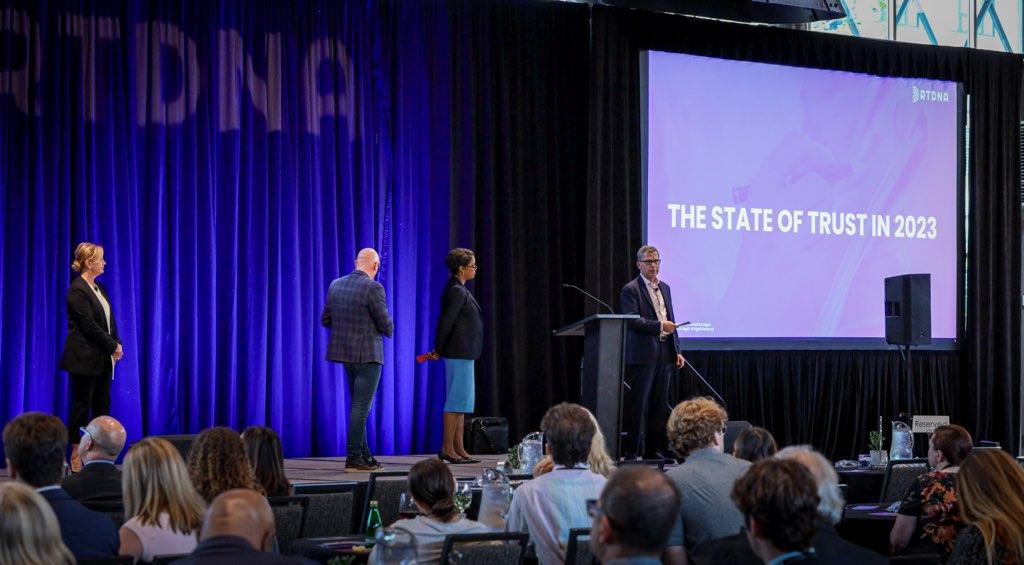RTDNA Publishes Study On Trust In Local News Elections Coverage

MINNEAPOLIS — Most U.S. local news consumers want journalists to ask tough, but respectful, questions of candidates and regularly fact check those running for office.
This was one of many key takeaways from a fact-finding research project on trust in elections coverage, commissioned by the Radio Television Digital News Association (RTDNA) and conducted by Magid. The findings were released publicly for the first time Thursday at RTDNA23 in Minneapolis.
According to the study, 62 percent of local news viewers and listeners say it is “very important” that local sources and journalists “ask tough, but respectful questions to get answers,” and 61 percent said it is very important they fact-check those candidates. Fifty-eight percent of the local news audience said it was very important those outlets have regular fact-checking segments.
Download the presentation to share in your newsroom
“In our highly polarized society, Americans need to rely on their trusted local sources of news to get the facts about candidates, campaigns and other political issues,” said RTDNA President and CEO Dan Shelley. “These findings offer a clear roadmap to ensure local reporters and news managers are providing voters with the information they crave to make critical decisions in the voting booth.”
The goal of the study was to better understand how newsrooms can build and maintain trust in their communities as they enter the 2024 election cycle, as they cover races and issues at the local, state and federal levels. RTDNA hopes newsrooms will review the data and incorporate it into their best practices, and RTDNA will work over the coming months to share training information and materials.
"This project on building and maintaining trust in news gathering is some of the most important work RTDNA has done in recent years,” RTDNA Chairman Tim Scheld said. "This is a critical moment in our nation's history where truth, transparency, accuracy and context are needed more than ever as we cover the Presidential Campaign. This work shows consumers want journalists to go deeper and to explore multiple angles in stories that matter. They want facts not opinions. They want depth not just headlines"
The study asked local news consumers to evaluate a variety of political issues and journalist practices and rate them from 1 (totally disagree) to 10 (totally agree) on how they impacted trust in local news. The findings revealed strong agreement (8-10 scores) by more than 50% of local news consumers on more than two dozen actions and qualities.
In addition to tough questions and fact-checking, there was consensus around several other issues, including:
-
Explaining complicated issues (60 percent)
-
Transparency about coverage and policies (56 percent)
-
In-depth and investigative coverage of the candidates’ backgrounds (55 percent)
-
In-depth and investigative coverage of candidates’ past actions or votes on issues (54 percent)
Overall, 47 percent of those surveyed said they were in strong agreement that the information they get from local news sources are accurate and correct. That number drops to 41 percent when local news outlets cover political issues.
Just 39 percent of people were in strong agreement that local news sources were balanced and represented all sides of an issue.
Methodology
Magid randomly selected 2,000 local news consumers (must use a local source at least once weekly), ages 18-64, for an online survey in June 2023. Of those 2,000, 50% identified as women, 49% identified as men, and 1% identified as non-binary.
About RTDNA
The Radio Television Digital News Association (RTDNA) is the world's largest professional organization devoted exclusively to broadcast and digital journalism. Founded as a grassroots organization in 1946, RTDNA’s mission is to promote and protect responsible journalism. RTDNA defends the First Amendment rights of electronic journalists throughout the country, honors outstanding work in the profession through the Edward R. Murrow Awards and provides members with training to encourage ethical standards, newsroom leadership and industry innovation.
(Photo: BP Miller / Chorus Photography)
